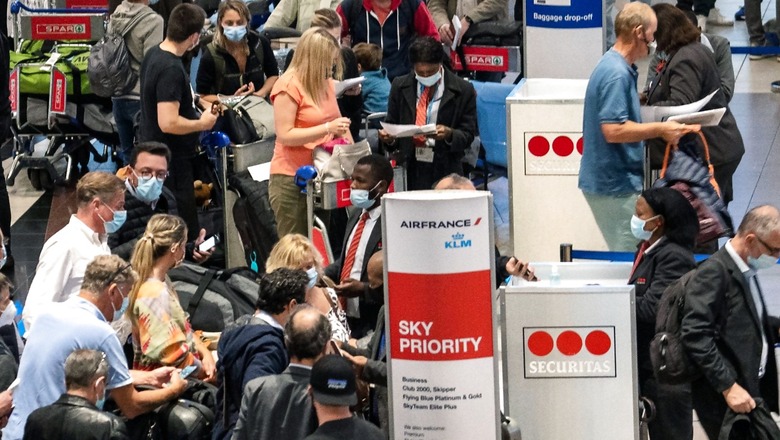
views
Omicron, the new coronavirus variant, has triggered global alarm as countries rush to suspend travel from southern Africa. The World Health Organisation (WHO) said Omicron may spread more quickly than other forms, and preliminary evidence suggested there is an increased risk of reinfection. Epidemiologists have warned that travel curbs may be too late to stop Omicron from circulating globally. The new mutations were first discovered in South Africa and have since been detected in Belgium, Botswana, Israel and Hong Kong so far.
The United States has said it will ban travel from South Africa and seven other African nations by non-US citizens beginning Monday. European Union nations have also agreed to impose a ban on travel from southern Africa to counter the variant’s spread. The UK, Canada and other countries have imposed similar restrictions.
The travel bans triggered by Omicron have renewed debate over whether flight and other travel restrictions work to prevent the spread of new Covid-19 variants. Some say at best the restrictions can buy time for new public health measures to be put in place. At worst, they do little to stop the spread and give a false sense of security.
WILL TRAVEL BANS SLOW THE SPREAD OF OMICRON VARIANT?
Travel bans might buy countries more time to speed up Covid-19 vaccination and introduce other measures, like masking and social distancing, but they are highly unlikely to prevent the entry of new variants, says Mark Woolhouse, professor of infectious diseases at the University of Edinburgh.
“Travel restrictions can delay but not prevent the spread of a highly transmissible variant,” he said.
Johns Hopkins University infectious disease specialist Dr Amesh Adalja says the travel restrictions only give the public a false sense of security and should stop being the “knee-jerk” reaction by public officials. Adalja noted imposing restrictions makes politicians “look as if they’re doing something” but doesn’t make sense when countries now have countermeasures such as rapid tests and vaccines.
Meanwhile, Sweden’s chief epidemiologist, Anders Tegnell told a local news agency said he does not believe that a travel ban would have any major effect, other than for countries with direct flights to the affected areas. “It is basically impossible to keep track of all travel flows,” Tegnell told the Expressen newspaper.
COULD IT BE DIFFERENT THIS TIME?
Jeffrey Barrett, director of Covid-19 Genetics at the Wellcome Sanger Institute, thought that the early detection of the new Omicron variant could mean restrictions taken now would have a bigger impact than when the Delta variant first emerged.
“The surveillance is so good in South Africa and other nearby countries that they found this (new variant), understood it was a problem and told the world very fast about it,” he said. “We may be at an earlier point with this new variant so there may still be time to do something about it.”
However, Barrett said harsh restrictions would be counter-productive and that the South African officials should not be punished for alerting the world to the new coronavirus variant. “They’ve done the world a service and we must help them, not penalise them for this.”
WHAT DOES THE SCIENCE SAY?
Sharon Peacock, who has led the genetic sequencing in Britain at the University of Cambridge, said any decisions to restrict travel were political decisions, not scientific ones. She emphasised that there was still great uncertainty about the Omicron variant, including whether it is actually more infectious or deadly. Although some of the mutations detected appeared worrying, she said there is still no proof that the new variant is any more lethal or transmissible than previous versions.
“It’s possible to keep infection out, but you would need very, very severe restrictions and only some countries would be willing to do this,” she said. “Buying time is important and worthwhile, but this is a decision for policymakers,” she said. “At the moment, we won’t have any definitive scientific answers for a few weeks.”
ECONOMIC IMPACTS
If there’s anything the global economy didn’t need, it’s more uncertainty. The new highly transmissible coronavirus poses an economic as well as a health risk, threatening to disrupt the global economic recovery and worsen supply chain bottlenecks that are already pushing prices higher. Markets plummeted around the world over worries about the variant — and reaction from political leaders.
“The most worrying thing about the new strain at the moment is how little we know about it,’’ said Craig Erlam, senior market analyst for the currency trading firm OANDA.
INDIA’S RESPONSE TO OMICRON
While no cases of Omicron variant have been detected in India, the government has added Hong Kong and Israel to the list from where travellers would need to follow additional measures on arrival, including post-arrival testing for infection. The complete list mentions South Africa, Brazil, Bangladesh Botswana, China, Mauritius, New Zealand, Zimbabwe, Singapore, Israel, Hong Kong, and countries in Europe, including the UK.
With inputs from AP and Reuters
Read all the Latest India News here


















Comments
0 comment